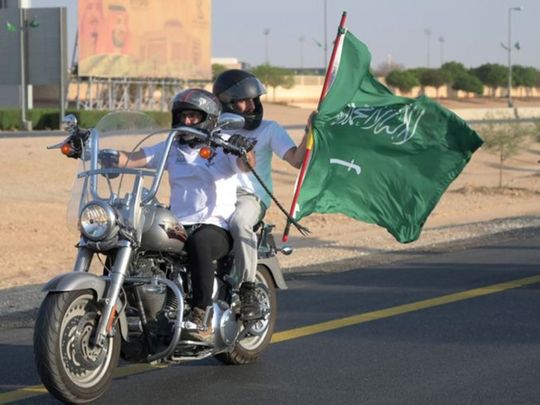
The Americans have their July 4 Independence Day, the French have their Bastille Day which falls on July 14. Pakistan and India celebrate their Independence Day in August, and Saudi Arabia has designated September 23 as their National Day.
This year was the 90th event of the National Day, a day the unification of the Kingdom of Saudi Arabia became complete and was celebrated with pomp and gaiety across the land this past weekend. The government had allowed the closure of most of its offices for the period and many private companies followed suit.
see more
- From the Editors: IPL to kickstart the showpiece in UAE; UAE ministry's COVID alert
- From the editors: UAE takes to cycling amid COVID-19 cares; Dubai hotels get ready for business
- From the editors: Global Village to boost consumer confidence
- From the editors: Big cruise liners may soon return to Dubai
The Kingdom’s largest National Day air show started with a bang as more than 60 commercial and military aircraft took to the skies over the country, drawing appreciation from the crowd on the ground. More was to follow with fireworks bursting onto a September sky and concerts heralded by international and local singers crooning into the night. This year’s celebration was hardly mooted by the threat of the Coronavirus as thousands thronged the entertainment spots, most sporting face masks and observing the social protocols brought upon by the pandemic. Families and singles, Saudis and expats, all were out in throngs to celebrate. Even the warm and humid September air could not deter the fun-seekers who were out to celebrate.
While there was order and decorum at most of the venues, a few reported civil disturbances by crowds getting involved in brawls and exhibiting unsocial behaviour. Those scenes were quickly captured on smartphones and sent out to various groups. Surprisingly in one such clip, a group of women all dressed in their Abayas and Niqabs were at it with each other, some even brandishing sticks to deliver a telling blow. For a society that had for decades veiled its women behind curtains, it was somewhat painful to watch.
In the days that followed, there was a bit of discussion on what transpired to these crowds who transformed what could have been a pleasant event into an ugly one with their unruly behaviour. Social media was not forgiving with many castigating what they saw in the video clips making the rounds, and were obviously disturbed.
Some called for their roundup and suggested that authorities jail these troublemakers for a short period of time to enforce a no-tolerance rule to such unsocial acts. Others were harder on the women involved in the brawl, suggesting that they had no place being outside of their homes on crowded nights. The debates will most likely continue for some time, but what was most obvious that such behaviour did take most of us by surprise. We are generally a mellow society and for this to happen, one must try to understand recent history that perhaps could explain such radical behaviour.
For decades, Saudi society was shackled by the dictates of the feared Saudi religious police who exercised their whims and interpretations of religion en masse over our society. Long-held cultural and social traditions were at odds with the demands of this group that solidified into a powerful unit beginning in the ‘80s of the last century.
For more than three decades, their sermons, edicts and fatwas patterned Saudi society into a very rigid and unyielding one. Women unfortunately fell mostly in their crosshairs as fatwa upon fatwa was being released, each more restrictive than the previous one. They couldn’t drive, they couldn’t work among men, they couldn’t attend entertainment fixtures, no cinemas or venues of entertainment and the list goes on. This suffocating suppression was bound to explode once the chains were off.
When King Salman took over and the Crown Prince took the decision to abolish the powers of the feared religious police, suddenly it seemed that all bets were off. The society was no longer shackled.
For most people the transition was smooth as people settled in their lives free from the distractions of sermons exhorting them to steer away from evil. But yet there remain some among us who are yet to understand their place in a civil society and are prone to disturbance.
For them the fever remains, but with time and the examples around them, it will undoubtedly abate.
— Tariq A. Al Maeena is a Saudi sociopolitical commentator. He lives in Jeddah, Saudi Arabia. Twitter: @talmaeena








